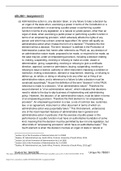ADL2601- Assignment 01
(a) Administrative action is, any decision taken, or any failure to take a decision by
an organ of the state when, exercising a power in terms of the Constitution or a
provincial constitution; or exercising a public power or performing a public
function in terms of any legislation; or a natural or juristic person, other than an
organ of state, when exercising a public power or performing a public function in
terms of an empowering provision, which adversely affects the rights of any
person and which has a direct, external legal effect.1An action will qualify as
administrative action when it takes the form of a decision.2 Therefore the first
element will be a decision. The term “decision” is defined in the Promotion of
Administrative Justice Act( herein after referred to as PAJA) as, any decision of
an administrative nature made, proposed to be made, or required to be made, as
the case may be, under an empowering provision, including a decision relating
to; making, suspending, revoking or refusing to make an order, award or
determination; giving, suspending, revoking or refusing to give a certificate,
direction, approval, consent or permission; issuing, suspending, revoking or
refusing to issue a licence, authority or other instrument; imposing a condition or
restriction; making a declaration, demand or requirement; retaining, or refusing to
deliver up, an article; or doing or refusing to do any other act or thing of an
administrative nature, and a reference to a failure to take a decision must be
construed accordingly.3 As per the definition of the term “decision” in the PAJA,
reference is made to a decision, “of an administrative nature”. Therefore the
second element is “of an administrative nature”, which indicates that decisions
need to relate to the day-to-day business of implementing and administering
policy. However, the decision, of an administrative nature, must be taken in terms
of an empowering provision. Therefore the third element is “an empowering
provision”. An empowering provision is a law, a rule of common law, customary
law, or an agreement, instrument or other document in terms of which an
administrative action was purportedly taken.4 This third element, underscores
one of the most important features of administrative law in general and
administrative action in particular, that the exercise of public power or the
performance of a public function must have an authoritative foundation of some
kind, meaning that the decision must be permitted by law not only legislation, but
other kinds of “empowering provisions” which have an authoritative basis.5 The
fourth element is when this decision involves an organ of state or natural or
1
Section 1(i) of the Promotion of Administration Act 3 of 2000
2
Buekes, M. Administrative Law, South Africa, Pretoria: University of South Africa, 2013.
3
Section 1(v) of the Promotion of Administration Act 3 of 2000
4
Section 1(vi) of the Promotion of Administration Act 3 of 2000
5
Buekes, M. Administrative Law, South Africa, Pretoria: University of South Africa, 2013 pg57
Student No: 56619782
This study source was downloaded by 100000835818796 from CourseHero.com on 03-17-2022 16:08:40 GMT -05:00
Unique No: 789501
https://www.coursehero.com/file/32810464/ADL2601-Assignment-01pdf/




